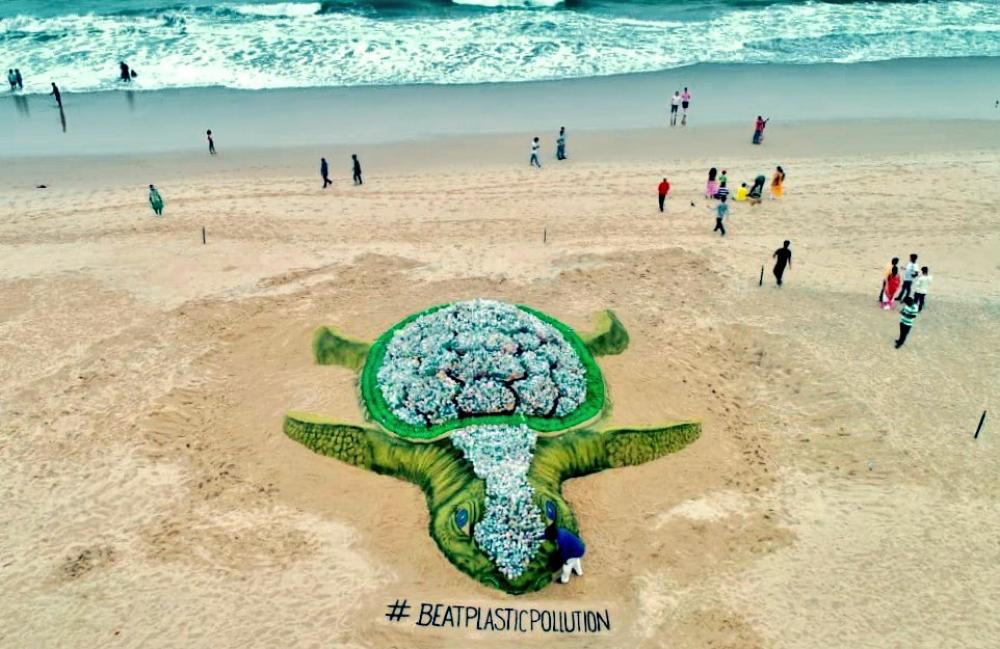Just Earth News | @justearthnews | 10 Jun 2018

New York:Communities around the world came together recently for the single largest annual celebration of our environment – World Environment Day.
This year, under the theme of ‘Beat Plastic Pollution’, people were encouraged to take a critical look at their own relation to single-use plastic, and make real efforts to break their dependency on disposable plastic.
World Environment Day will mark the culmination of a global campaign from the United Nations to raise awareness and inspire action on plastic pollution.
As global hosts, India did more than raise awareness. With an announcement to eliminate all single-use plastic in the country by 2022, India has effectively set the pace in the global race to beat plastic pollution.. This unprecedented and ambitious move against disposable plastic will drastically stem the flow of plastics from 1.3 billion people and business in the fasted growing economy in the world.
“I am proud to see what is taking place this World Environment Day. It is incredibly encouraging to see communities everywhere take responsibility for the tide of plastic pollution that is threatening our ecosystems,” said Erik Solheim, head of UN Environment. “From clean-ups on every continent to far-reaching policy agreements, this World Environment Day has made a great difference in how we view the production, consumption, and discharge of single-use plastics.”
With a focus on the future, UN Environment also launched a groundbreaking Report: “Single-use Plastics: A roadmap for Sustainability” today. The report is an unprecedented global outlook on efforts to beat plastic pollution, providing analyses of case studies from more than 60 countries to present the world’s first comprehensive study of the global movement to beat plastic pollution.
Government action to tackle plastic pollution
Governments around the world are stepping up to the challenge of tackling the tide of plastic pollution, implementing measures to mitigate future impacts on their nations. Indian Prime minister Narendra Modi made the bold commitment to eliminate all single-use plastics in the country by 2022, in an unprecedented ambitious measure to beat plastic pollution.
Spurred by the World Environment Day momentum, plastic bags have also announced to be banned in Chile, Botswana, and Peru, while Nigeria will set up recycling plants across the country. Brazil will announce a new national plan on plastics and Wales will commit to being the first “refill nation”. Across all continents, 50 countries have now joined the UN’s Clean Seas campaign against marine litter.
Private Sector steps up
From businesses, NGO’s and major sports bodies, private sector leaders are making bold commitments to join the movement against single-use plastics, including the International Olympic Committee; WWF International; Roland Garros; Federation International de Motocyclisme; the India Premier League; LG Electronics; Volvo; and Infosys, to name a few.
On June 4th, the International Olympic Committee announced the support of seven major sports bodies and 20 national federations who will be acting to take disposable plastic out of their sports, making it the biggest ever commitment from the sports community on this issue.
Going Viral
With thousands of citizen-organized events around the globe, the call to #beatplasticpollution has a created a viral moment.Hailed as the “new ice bucket challenge”, the hashtag trended on Twitter, Instagram, and Facebook, mobilizing thousands of people online. From everyday consumers to some of the most famous names in Hollywood and Bollywood, thousands pledged to stop using disposable plastic items.
“Our world is swamped by harmful plastic waste. Every year more than 8 tonnes end up in the oceans,” UN Secretary-General António Guterres said in a video message on the day. “On World Environment Day, the message is simple: reject single-use plastic. Refuse what you can’t reuse. Together we can chart a path to a cleaner, greener world.”
A global movement
World Environment Day was, above all, a global celebration of our collective connection with nature. On every continent, communities came together to highlight their vision of a sustainable future.
In North America, at the Ocean Heroes Bootcamp, youth leaders joined UN Goodwill Ambassador Adrian Grenier, leaders and local citizens to highlight their commitments a pollution-free planet, .Cleanups of parks, riverfronts, beaches, and cities brought people together against plastic pollution in Vancouver, New Orleans, and Washington D.C., while at UN headquarters in New York a green fair and high-level dialogue highlighted sustainable lifestyle solutions to the diplomatic community.
Volunteers in Nairobi, Kenya rolled up their sleeves for a massive cleanup in Kibera, Africa’s biggest informal settlement, taking the first steps to restoring what was once a sprawling lake in the middle of the neighborhood. In Kenya’s western city of Kisumu, sustainable retail was spotlighted with an elegant fashion show while the official national event in Mombasa saw policymakers discussed the future of PET in a national sustainable plastic framework.
In Europe, celebrations kicked off last week with a heroic swim across Geneva’s lake Léman, featuring volunteers dragging balloons symbolizing the weight of plastic waste produced per person in different European countries, and tourists visiting Brussels got to celebrate World Environment Day with the iconic statue of “Manneken Pis”, dressed up for the occasion.
Asia turned its focus on art to highlight the issue of plastic pollution, with 12 large-scale art installations prominently featured in a dozen cities across Asia Pacific. From traditional statues, to whimsical creations and abstract spheres made from plastics, the exhibits drew attention to the quintessentially international problem of plastic waste.
Across Latin America, cleanups happened all over the continent, from the Galapagos Island in Ecuador to the Sea of Cortez in Mexico. Finally, Honduras committed to fighting marine litter by joining UN Environment’s CleanSeas program.
Image: Sudarshan Pattnaik Twitter page